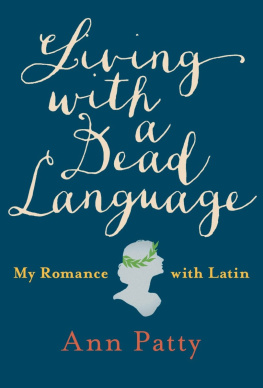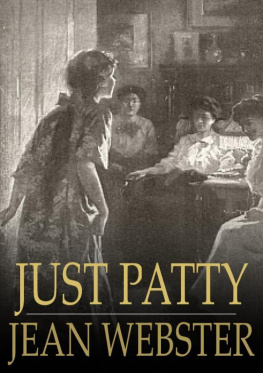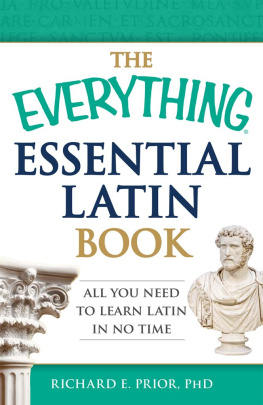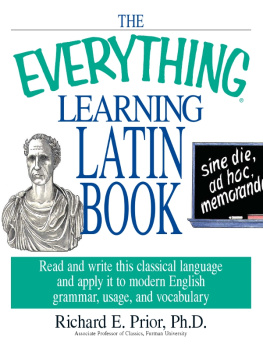A ll translations from the Latin were done by me. I have not tried to render the Latin into poetic English. While my translations do not demonstrate the beauty of the Latin, they are, as much as I was able, faithful to the literal meanings.
After five years of study, I am at best an amateur Latinist. Any errors of scholarship are mine alone and should not be attributed to my teachers.
ARGUMENTUM
What was to be the value of the long looked forward to,
Long hoped for calm, the autumnal serenity
And the wisdom of age?...
The serenity only a deliberate hebetude,
The wisdom only the knowledge of dead secrets
T. S. Eliot, East Coker
W hy on earth would you want to learn Latin at your age? incredulous friends ask.
I have a short answer and a longer answer. The short answer is because I love words and grammar. The longer answer is, I hope, more interesting and is why I wrote this book.
Hebetude, in the stanza above, comes from the Latin hebetudo, from the verb hebeo, meaning to be dull, sluggish, inactive. The American Heritage Dictionary, my lexicographic bible for this book, defines hebetude as dullness of mind, mental lethargy.
For thirty-five years, Id been driven, constantly challenged, not only by my work as a New York editor and publisher, but also by class, competition, men, sex, motherhood, illness, and loss; by everything that is life in New York City.
At fifty-eight, I stopped working and retreated to the well-earned autumnal serenity of my country house in upstate New York. But I was not serene. I was filled with anxiety. What was I to do with myself? How was I to fill the days, the weeks, the months, the years? I was lost in the woods.
My mother was the same age, fifty-eight, when the last of my siblings moved away from home, and I had watched this once industrious, gregarious, lively woman sink into depression, drink, and a feeling of uselessness. Shed lost her metier of running a family of six, and she hadnt the energy to pursue another. Im done, shed say, again and again. I believe she willed herself to die at age sixty-six.
Why did I take up Latin at this late age? I did so not only to fight off hebetude but also to avoid becoming my mother. I had no idea, when I began my studies, that rather than dead secrets, I would discover vital constructs that would illuminate my past as well as my present, and enliven my future. That I would conjure the dead language of my mother to life.
CHAPTER 1
Rem tene, verba sequentur.
Grasp the topic, the words will follow.
Cato the Elder
Verba tene, res sequentur.
Grasp the words, the topic will follow.
Umberto Eco
I t began with benevolence. I was in the seventh grade and my oldest brother, Terry, was home for Thanksgiving. He was in his freshman year in college at UC Berkeley, a short fifteen miles away on the map, but worlds distant from our home on Elysian Fields Drive in East Oakland. Along with such exotica as sauted mushrooms, espresso coffee, and romaine lettuce, Terry brought home books and words. I dont remember the context in which he used benevolence, but I dont think I had ever heard such a sonorous four-syllable word used in speech before. I wanted that word, and ran off to my room to write it down and look up its meaning in the dictionary. I loved how it extended the concept of kindness into a worldview.
I began collecting words. By ninth grade, I was using my new words in conversation whenever I could. This did not delight my classmates, and forced me to drop the phony stupid-girl act I had adopted in a futile quest for popularity. (In the midsixties, it was the height of uncool at my school to be smart. I still remember being mortified when a friend in eighth grade started telling everyone I got straight As on my report card.) I decided to become an intellectual, an important-sounding, polysyllabic concept.
Books and words were in short supply in our household. Neither of my parents had gone to college, though my mother was an avid worker of crossword puzzles and often bragged that she was so good at them because shed studied Latin all during her Catholic education. Shed even won the Latin medal when she graduated from high school. Latin, for her, was the expression of her intelligence. But her engagement with words was solitary, and she did not use Latin words or phrases around us, nor explain how they helped her solve the crossword clues.
The only interest my father showed in words was in trying to rid us of certain verbal tics that annoyed him: Whenever one of us (too frequently) said, Yaknow? he would say, No, I dont know. Whenever we said, Thats true, he would say, No. True lives across the street. True being the name of the doctors wife in the pink ranch opposite our house.
After benevolence, I was always on the alert for new words that came my way, and Id add them to my growing list of words and their definitions. Id test myself against the It Pays to Enrich Your Word Power pages in the monthly Readers Digest. Soon I knew all the words on offer there.
During high school I spent most of my spare time reading, writing bad poetry, and discussing books (often recommended by Terry) with my best friend, Shannon. Words had become my other best friend: I spent hours following strings of synonyms through the dictionary. I became obsessed with suffixes, especially with words ending in -id. I loved the -id words: languid, pellucid, insipid, intrepid. They have an interior, intense quality; the -id ending carries the scent of moral or esthetic indulgence, whether good or bad. It forces the tongue to execute a dental stop to finish the word, as if its entitled. Even before I knew Freuds id, and what it meant, I seemed to have intuited it in many -id words. Each seemed a quiddity (!) of a state of being, complete in itself. After several years, my collection of -id words was large enough to construct the House of Ids.








